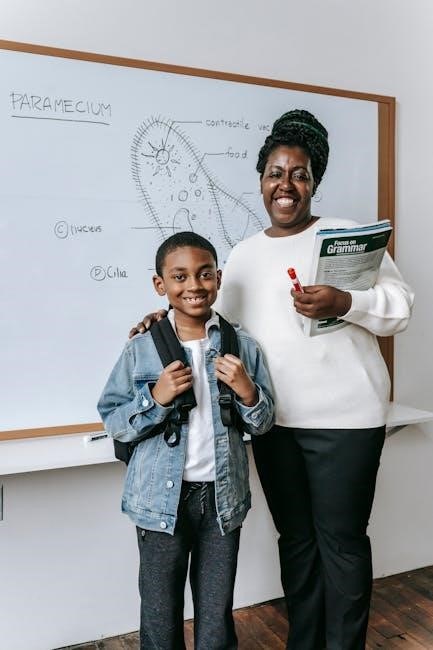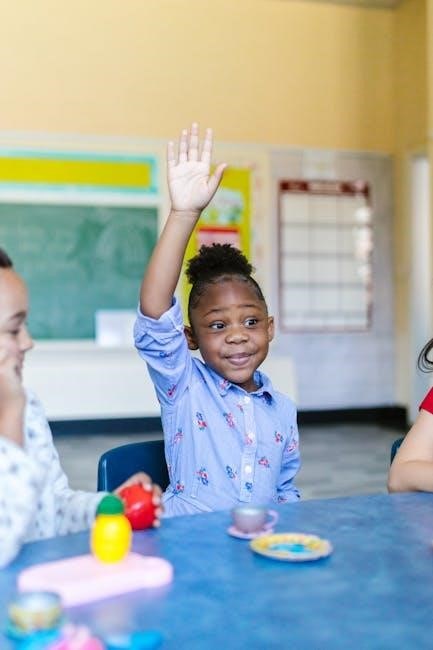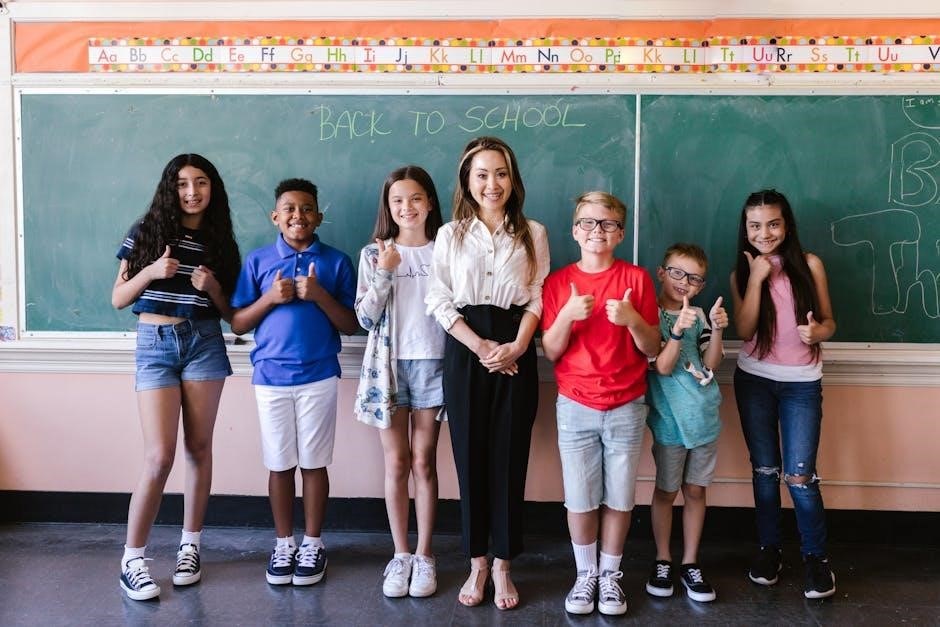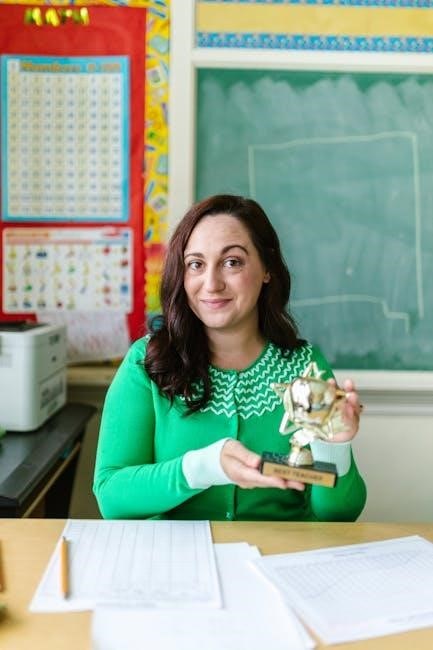Special education teachers play critical roles in schools‚ requiring unique skills and knowledge to support exceptional students‚ as outlined in various online resources and documents‚ including pdf guides and reports‚ available online now.
Overview of Responsibilities
Special education teachers have a wide range of responsibilities‚ including developing and implementing individualized education programs‚ assessing student progress‚ and collaborating with general education teachers. They must also communicate effectively with parents and other professionals‚ such as therapists and counselors‚ to ensure that students receive comprehensive support. According to online resources‚ special education teachers are responsible for creating a safe and inclusive learning environment that meets the diverse needs of their students. This requires a deep understanding of various teaching methods‚ technologies‚ and strategies to accommodate different learning styles and abilities. By examining the roles and responsibilities of special education teachers‚ as outlined in pdf guides and reports‚ it is clear that their work is complex and multifaceted‚ requiring a unique blend of pedagogical expertise‚ emotional intelligence‚ and interpersonal skills to support the academic‚ social‚ and emotional growth of exceptional students.

Main Roles of Special Education Teachers
Special education teachers serve as instructors‚ evaluators‚ and consultants‚ supporting students with diverse needs‚ as outlined in online pdf guides and educational resources‚ every day‚ always.
Teacher in a Self-Contained Classroom
A teacher in a self-contained classroom is responsible for providing instruction to students with special needs‚ creating a supportive learning environment‚ and developing individualized educational plans. This role requires strong organizational and communication skills‚ as well as the ability to adapt instruction to meet the unique needs of each student. The teacher must also be able to manage classroom behavior‚ provide emotional support‚ and collaborate with other educators and support staff. According to online resources‚ including pdf guides‚ this role is critical in providing students with the support they need to succeed academically and socially. By providing a structured and supportive learning environment‚ teachers in self-contained classrooms can help students with special needs reach their full potential and achieve their educational goals. Effective teaching strategies and techniques are essential in this role‚ as outlined in various educational resources and documents.
Resource Teacher and Educational Evaluator
A resource teacher and educational evaluator plays a crucial role in supporting students with special needs‚ providing additional instruction and guidance to help them succeed. This role involves working with students in small groups or one-on-one‚ developing and implementing individualized educational plans‚ and evaluating student progress. The resource teacher must also collaborate with general education teachers‚ providing guidance and support to ensure that students with special needs are fully included in the educational process. According to online resources‚ including pdf guides‚ the resource teacher and educational evaluator must have strong assessment and evaluation skills‚ as well as the ability to communicate effectively with students‚ teachers‚ and parents. By providing targeted support and guidance‚ resource teachers can help students with special needs overcome challenges and achieve their educational goals‚ as outlined in various educational documents and resources available online. Effective evaluation and assessment are key components of this role.

Responsibilities in Different Settings
Special education teachers work in various settings‚ including schools‚ hospitals‚ and clinics‚ with diverse responsibilities that require unique skills and knowledge to support students with special needs effectively.
IEP Committee Member and Consultant Teacher
As an IEP committee member‚ the special education teacher plays a crucial role in developing and implementing individualized education programs for students with special needs. The teacher works collaboratively with other committee members‚ including parents‚ general education teachers‚ and other support staff‚ to identify student strengths and weaknesses‚ and to set measurable goals and objectives. Additionally‚ as a consultant teacher‚ the special education teacher provides support and guidance to general education teachers‚ helping them to adapt their instruction and materials to meet the needs of students with special needs. This may involve providing professional development‚ modeling instructional strategies‚ and providing feedback and coaching. The special education teacher’s expertise and knowledge of special education laws and regulations‚ such as IDEA‚ are essential in these roles‚ and they must be able to communicate effectively with other professionals and parents to ensure that students receive the support they need to succeed.
Teacher in a Self-Contained Special School Classroom
A teacher in a self-contained special school classroom is responsible for providing instruction to students with severe or multiple disabilities. The teacher develops and implements individualized lesson plans‚ adapting curriculum to meet the unique needs of each student. They also assess student progress‚ using various methods to evaluate student learning and adjust instruction accordingly. In this setting‚ the teacher often works with a team of support staff‚ including paraprofessionals and related service providers‚ to provide a comprehensive program of instruction and support. The teacher must be able to create a positive and supportive learning environment‚ using strategies such as positive behavioral interventions and supports to promote student engagement and learning. By providing specialized instruction and support‚ the teacher helps students with significant disabilities to achieve their full potential and develop the skills they need to succeed in life. Effective communication with families and other professionals is also essential in this role.

Developing Curricula and Monitoring Progress
Special education teachers develop and implement curricula‚ monitoring student progress‚ using online resources and pdf guides to inform instruction and assessment practices effectively always.
Collaboration with General Education Teachers
Special education teachers work closely with general education teachers to support student learning‚ sharing strategies and resources to inform instruction and assessment practices. This collaboration is essential in developing and implementing individualized education programs (IEPs) that meet the unique needs of students with disabilities. Through regular meetings and communication‚ special education teachers and general education teachers can coordinate their efforts to provide a cohesive and supportive learning environment. By working together‚ they can identify areas of strength and weakness‚ develop targeted interventions‚ and monitor student progress. Effective collaboration between special education teachers and general education teachers is critical in ensuring that students with disabilities receive the support and accommodations they need to succeed academically and socially. This collaborative approach helps to foster a sense of community and shared responsibility for student learning‚ ultimately benefiting all students in the classroom.

Challenges in Special Education Teaching
Special education teachers face challenges in planning‚ instructing‚ and assessing students with diverse needs and abilities‚ requiring adaptability and creativity in the classroom every day online.
Planning‚ Instructing‚ and Assessing
Special education teachers are responsible for planning‚ instructing‚ and assessing students with diverse needs and abilities. They must develop individualized education plans‚ implement instructional strategies‚ and assess student progress. This requires a deep understanding of the subject matter‚ as well as the ability to adapt instruction to meet the unique needs of each student. Teachers must also be able to assess student learning and adjust their instruction accordingly. According to online resources‚ including pdf guides‚ special education teachers must be skilled in the use of various assessment tools and techniques‚ including standardized tests‚ observation‚ and portfolio assessment. By using these tools‚ teachers can gather data on student learning and make informed decisions about instruction. Effective planning‚ instructing‚ and assessing are critical to ensuring that students with special needs receive a high-quality education and achieve their full potential. Special education teachers play a critical role in this process.
Professional Requirements and Legal Considerations
Special education teachers must meet certification requirements and adhere to legal standards‚ as outlined in online pdf guides and resources‚ to ensure compliance and professionalism always.
Communication and Collaboration in Professional Settings
Effective communication and collaboration are essential for special education teachers‚ as they work with various professionals‚ including general education teachers‚ administrators‚ and support staff‚ to ensure student success;
Special education teachers must be able to clearly articulate student needs‚ develop strategies‚ and implement plans‚ all while maintaining open lines of communication with colleagues and families‚ as outlined in online resources and pdf guides.
Collaboration with general education teachers is critical‚ as it enables special education teachers to adapt curriculum and instructional methods to meet the diverse needs of students‚ and to monitor progress and adjust instruction accordingly‚ ultimately leading to improved student outcomes and a more supportive learning environment.